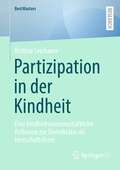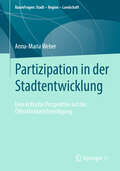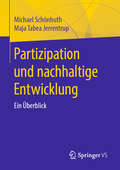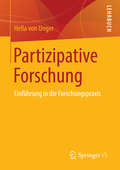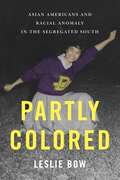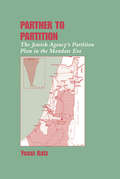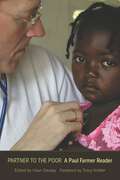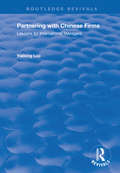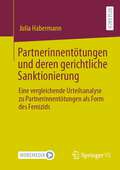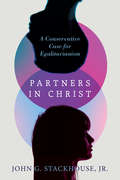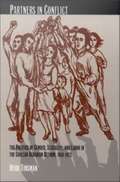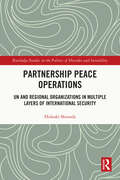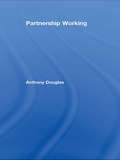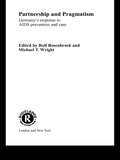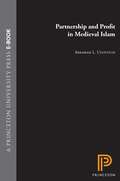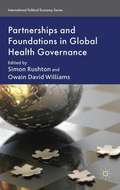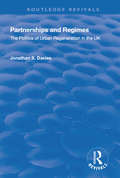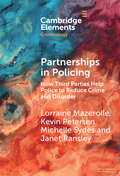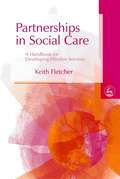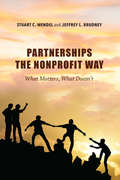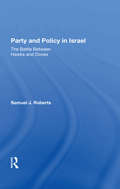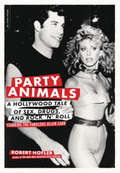- Table View
- List View
Partizipation in der Kindheit: Eine kindheitswissenschaftliche Reflexion zur Demokratie als Herrschaftsform (BestMasters)
by Bettina LeichauerPartizipation oder auch Kinder- und Jugendbeteiligung beziehen sich u. a. auf eine unterschiedlich umfänglich alltagsgerichtete Teilhabe von jungen Menschen und eine zukunftsorientierte Demokratiebildung. Bei der fast schon inflationären Verwendung des Begriffs "Partizipation" bleibt jedoch häufig unklar, was darunter verstanden wird oder werden soll. Eingebettet in den gesellschaftlichen Kontext der Demokratie als Herrschaftsform wird das dualistische Verhältnis von Partizipation als Chance für Entscheidungsbetroffene versus Partizipation als Instrument der Herrschenden aufgezeigt. Denn auch wenn Partizipation im öffentlichen Diskurs verspricht, eine Möglichkeit des Mitredens und -wirkens zu sein, muss sie nicht zwangsläufig auf Veränderung zielen, sondern kann gleichermaßen bestehende Ungleichheitssysteme stabilisieren. Mit Blick auf Kindheit gilt es besonders die Ungleichheit von Akteur*innen innerhalb der generationalen Ordnung hervorzuheben. Es wird sich mit der Frage auseinandergesetzt, wie Partizipation unter Ungleichen innerhalb dieser generationalen Verortungen und der damit verbunden asymmetrischen Sozialisationsarrangements überhaupt gelingen kann und welchen Möglichkeitsräumen, Restriktionen und Gefahren des Machtmissbrauchs sie unterliegt.
Partizipation in der Stadtentwicklung: Eine kritische Perspektive auf die Öffentlichkeitsbeteiligung (RaumFragen: Stadt – Region – Landschaft)
by Anna-Maria WeberÖffentlichkeitsbeteiligung wurde viele Jahre als Allheilmittel für eine erfolgreiche Umsetzung von Stadtplanungs- und -entwicklungsprozessen angesehen. Immer deutlicher jedoch wird, dass die alltäglichen Erfahrungen auf kommunaler Ebene häufig stark von den normativen Erwartungen und Anforderungen der Theorie abweichen und unintendierte Nebenwirkungen auftreten. Daran anknüpfend wirft die Arbeit einen kritischen Blick auf die Öffentlichkeitsbeteiligung bei Stadtplanungs- und -entwicklungsprozessen und untersucht am Beispiel der Stadt Riedlingen, was die Gründe für den (Miss-)Erfolg von Partizipationsprozessen sind. Anhand von qualitativen leitfadengestützten Interviews mit Bürger*innen und Vertreter*innen von Stadtverwaltung und den beauftragten planenden und beratenden Büros sowie auf Basis eines sozialkonstruktivistischen Zugriffs kombiniert mit der Systemtheorie nach Luhmann kann aufgezeigt werden, dass die Konstruktion der Öffentlichkeitsbeteiligung sowohl von den individuellen Erfahrungen und persönlichen Interessenslagen, als auch den systemischen Logiken der involvierten Akteure abhängig ist, wodurch eine erfolgreiche Kommunikation zwischen den involvierten Akteuren unwahrscheinlich wird. Aus den empirischen Befunden geht überdies hervor, dass die Erfahrungen mit und Bewertungen von den gegenwärtigen Beteiligungsverfahren in Riedlingen überwiegend negativ gefärbt sind. Als Gründe für den Misserfolg der Partizipationsprozesse werden vor allem die geringe und selektive Beteiligung, die begrenzten Möglichkeiten der Einflussnahme, fehlendes Lokalwissen der beauftragten Büros, die Unübersichtlichkeit der Verfahren und deren Einbettung in die Projektplanung sowie die unzureichenden Umsetzungen der geäußerten Anliegen hervorgehoben. Anhand der Ausführungen der Interviewpartner*innen wird deutlich, dass die Öffentlichkeitsbeteiligung in Riedlingen eher zu Frustration und Vertrauensverlust führt, statt in einer gesteigerten Legitimation und Akzeptanz von Planungsprojekten resultiert und es daher einer kritischen Selbstreflektion und Nachjustierung von Partizipationsprozessen bedarf.
Partizipation und nachhaltige Entwicklung: Ein Überblick
by Michael Schönhuth Maja Tabea JerrentrupDas vorliegende Buch führt in das Feld der partizipativen Lern- und Forschungsansätze für nachhaltige Entwicklung ein. Es richtet sich an alle, die auf der akademischen oder praktizierenden Seite arbeiten und ihr Wissen in diesem Feld vertiefen, bzw. ihr Methodenrepertoire erweitern wollen. Die Theoriebezüge, methodologischen Ansätze, Instrumente und Beispiele wurden so gewählt, dass Sie am Ende das Feld in seinen wesentlichen Einsatzbereichen (Lernen, Forschung, Beratung) kennengelernt haben, seine Möglichkeiten und Grenzen einschätzen und diesen Lernfortschritt für Ihre Arbeit nutzen können.
Partizipative Forschung: Einführung in die Forschungspraxis
by Hella UngerDie Monographie führt in die Konzepte, Verfahren, Probleme und Anwendungsfelder partizipativer, qualitativer Forschung in den Sozialwissenschaften ein. Verschiedene Ansätze partizipativer Forschung werden überblicksartig mit Bezug auf die internationale Literatur und methodologische Grundlagen vorgestellt. Zentrale Prinzipien einer partizipativen Forschungspraxis werden erläutert. Das methodische und forschungspraktische Vorgehen wird anhand von praktischen Beispielen und Arbeitsschritten illustriert, um dem Leser/ der Leserin eine Hilfestellung zu bieten für die Planung, Durchführung und Verwertung eigener partizipativer Forschungsprojekte.
Partly Colored: Asian Americans and Racial Anomaly in the Segregated South
by Leslie Bow2012 Honorable mention for the Book Award in Cultural Studies from the Association for Asian American StudiesArkansas, 1943. The Deep South during the heart of Jim Crow-era segregation. A Japanese-American person boards a bus, and immediately is faced with a dilemma. Not white. Not black. Where to sit?By elucidating the experience of interstitial ethnic groups such as Mexican, Asian, and Native Americans—groups that are held to be neither black nor white—Leslie Bow explores how the color line accommodated—or refused to accommodate—“other” ethnicities within a binary racial system. Analyzing pre- and post-1954 American literature, film, autobiography, government documents, ethnography, photographs, and popular culture, Bow investigates the ways in which racially “in-between” people and communities were brought to heel within the South’s prevailing cultural logic, while locating the interstitial as a site of cultural anxiety and negotiation.Spanning the pre- to the post- segregation eras, Partly Colored traces the compelling history of “third race” individuals in the U.S. South, and in the process forces us to contend with the multiracial panorama that constitutes American culture and history.
Partner Violence
by Zeev WinstokAs domestic violence continues to be a focus of social and psychological concern, two basic contradictory viewpoints endure: one rooted in male power dynamics, the other maintaining that both genders use and are victimized by violence. Although both sides have their merits, neither has adequately answered the crucial question: What causes conflict to escalate into violence? Partner Violence: A New Paradigm for Understanding Conflict Escalation adds a third, escalation-focused paradigm to the debate, addressing the limitations of the two dominant perspectives in a comprehensive scholarly approach. This concise yet comprehensive volume examines key gender- and non-gender-related violence issues and sets out a compelling behavioral argument that using violence to control others is a rational choice. Its theoretical and empirical foundations support an in-depth study of escalating aggression in violent relationships, both throughout periods of chronic conflict and in single violent episodes. This analysis promotes a broader and deeper understanding of partner violence, suitable to developing more finely targeted, effective, and lasting interventions. Among the key topics featured are: Gender differences in aggressive tendencies. Dominance, control, and violence. Partner violence as planned behavior. The process leading to partner violence. Partner conflict dynamics throughout relationship periods and within conflicts. Gender differences in escalatory intentions. Partner Violence is an important volume for researchers, graduate students, and clinicians/professionals across various disciplines, including personality and social psychology, criminology, public health, clinical psychology, sociology, and social work.
Partner to Partition: The Jewish Agency's Partition Plan in the Mandate Era
by Yossi KatzIn this work Yossi Katz shows that the Jewish Agency Executive's partition plan, though never implemented, was not an isolated episode, but had short- and long-term implications from the Jewish perspective - that as well as having an impact on the immediate settlement policies, it also had significant effect on the partition of Palestine in the late 1940s, and on shaping the state-in-formation.
Partner to the Poor: A Paul Farmer Reader
by Haun Saussy Paul FarmerThis book illuminates the depth and impact of anthropologist and physician Paul Farmer's contributions and demonstrates how, over time, this unassuming and dedicated doctor has fundamentally changed the way we think about health, international aid, and social justice.
Partner to the Poor: A Paul Farmer Reader (California Series in Public Anthropology #23)
by Paul FarmerFor nearly thirty years, anthropologist and physician Paul Farmer has traveled to some of the most impoverished places on earth to bring comfort and the best possible medical care to the poorest of the poor. Driven by his stated intent to "make human rights substantial," Farmer has treated patients—and worked to address the root causes of their disease—in Haiti, Boston, Peru, Rwanda, and elsewhere in the developing world. In 1987, with several colleagues, he founded Partners In Health to provide a preferential option for the poor in health care. Throughout his career, Farmer has written eloquently and extensively on these efforts. Partner to the Poor collects his writings from 1988 to 2009 on anthropology, epidemiology, health care for the global poor, and international public health policy, providing a broad overview of his work. It illuminates the depth and impact of Farmer’s contributions and demonstrates how, over time, this unassuming and dedicated doctor has fundamentally changed the way we think about health, international aid, and social justice.A portion of the proceeds from the sale of this book will be donated to Partners In Health.
Partnering with Chinese Firms: Lessons for International Managers
by Yadong LouThis title was first published in 2000: This work is aimed at international managers or business students who are interested in emerging markets, particularly China. It provides conceptual backgrounds, analytical frameworks, managerial insights, business guidance, and practical evidence concerning partner selection for both foreign and Chinese investors. It addresses how foreign companies should select ideal Chinese firms as well as what Chinese firms are looking for from foreign investors. The book is divided into three parts. The first part presents an overview of multinational enterprises (MNEs) in China and outlines the economic environment facing these firms. The second part delineates how to select appropriate partner firms from both foreign and Chinese parents perspectives. The third part includes ten case studies showing how leading MNEs in the world adopt entry and co-operative strategies (including partner selection) that align properly with internal capabilities, external environment, and organizational needs. Based on a variety of archival and Internet sources, these case studies are prepared by the author for discussion purposes.
Partnering with Parents
by Barry Trute Diane Hiebert-MurphyInternationally recognized as the gold standard in providing services to children with special needs and their family members, family-centred practice has developed substantially over the past two decades. However, there has not been until now a basic practice text for guiding professional education and skill building across diverse areas. Filling this significant gap, Partnering with Parents is a primer on family-centred practice for professionals working in children's health and developmental services.The material in this textbook spans interdisciplinary training across key child service sectors (particularly child development, child mental health, and children's health). The authors identify and discuss the key principles of the model as it is practiced in Canada, with a focus on working alliances, empowerment methods, and the development of social support resources. Providing examples of the application of family-centred practice in a wide range of service settings, Partnering with Parents will be useful for the social workers, nurses, psychologists, and allied health professionals who work together in complex service situations.
Partnerinnentötungen und deren gerichtliche Sanktionierung: Eine vergleichende Urteilsanalyse zu Partnerinnentötungen als Form des Femizids
by Julia HabermannImmer wieder steht die Frage im Raum, ob Gewalt gegen Frauen zu milde sanktioniert werde. Die vorliegende Arbeit beantwortet diese Frage für Partnerinnentötungen, also die Tötung der Frau durch den (ehemaligen) Ehemann, Partner oder Freund. Nachdem eine mildere Sanktionierung von Partnerinnentötungen theoretisch begründet wird, wird der empirische Forschungsstand zu Partnerinnentötungen, zur Strafzumessungsforschung und Sanktionierungspraxis dargelegt. Anhand von 472 wegen Mordes oder Totschlags verurteilten Tätern werden Partnerinnentötungen in vergleichender Perspektive zu anderen Tötungsdelikten ausgewertet. Neben der Beschreibung von Gemeinsamkeiten und Unterschieden hinsichtlich Täter, Opfer und Tat steht die Sanktionierung der Täter im Fokus der Auswertung. Es werden dabei die Fragen beantwortet, inwiefern Täter eine Partnerinnentötung wegen Mordes oder Totschlags verurteilt werden, wie ihre Schuldfähigkeit bewertet wird, welche Strafzumessungsfaktoren herangezogen werden und welche Straflängen ergehen. Zudem werden in einer qualitativen Betrachtungsweise Argumentationsstrukturen der Richter*innen wiedergegeben. Die Arbeit zeigt abschließend auf, wie eine Verbesserung der Rechtsprechungspraxis ausgestaltet sein könnte.
Partners in Christ: A Conservative Case for Egalitarianism
by John G. Stackhouse Jr.andandFinally Feminist
Partners in Conflict: The Politics of Gender, Sexuality, and Labor in the Chilean Agrarian Reform, 1950-1973
by Heidi TinsmanPartners in Conflict examines the importance of sexuality and gender to rural labor and agrarian politics during the last days of Chile's latifundia system of traditional landed estates and throughout the governments of Eduardo Frei and Salvador Allende. Heidi Tinsman analyzes differences between men's and women's participation in Chile's Agrarian Reform movement and considers how conflicts over gender and sexuality shape the contours of working-class struggles and national politics. Tinsman restores women to a scholarly narrative that has been almost exclusively about men, recounting the centrality of women's labor to the pre-Agrarian Reform world of the hacienda during the 1950s and recovering women's critical roles in union struggles and land occupations during the Agrarian Reform itself. Providing a theoretical framework for understanding why the Agrarian Reform ultimately empowered men more than women, Tinsman argues that women were marginalized not because the Agrarian Reform ignored women but because, under both the Frei and Allende governments, it promoted the male-headed household as the cornerstone of a new society. Although this emphasis on gender cooperation stressed that men should have more respect for their wives and funneled unprecedented amounts of resources into women's hands, the reform defined men as its protagonists and affirmed their authority over women. This is the first monographic social history of Chile's Agrarian Reform in either English or Spanish, and the first historical work to make sexuality and gender central to the analysis of the reforms.
Partnership Peace Operations: UN and Regional Organizations in Multiple Layers of International Security (Routledge Studies in the Politics of Disorder and Instability)
by Hideaki Shinoda"Partnership" is a key concept in contemporary international peace operations. There is no universal model of peace operations in contemporary international society. Ad hoc arrangements of "partnership" between the United Nations and various regional organizations are consequences of the complex circumstances of international security. The ways in which "partnerships" are organised differently in different regions reflect each region's distinctive security situation. The universal nature of "liberal peacebuilding" is thus maintained only by ad hoc arrangements.All the UN peacekeeping operations in Africa have some partnership linkages with regional or sub-regional organizations ranging from the African Union (AU) and regional mechanisms to the European Union (EU). What are the conditions and characteristics that enable or lead to partnership peacekeeping in Africa? How should we understand lower levels of partnership peacekeeping in other regions? By highlighting key characteristics of partnership peacekeeping, the book explores these issues and argues that partnership is a reflection of political circumstances.The book provides an unexplored but critical perspective to understand the contemporary world for those who study International Relations, Security Studies, International Organizations, and Peace Studies.
Partnership Working
by Anthony DouglasPartnership working is recognised as the most effective way of improving social care services, and a non-negotiable part of the government’s aim is to provide a seamless care service. However, for students undertaking placements or for more experienced professionals moving to a different service area, the question is: what does it mean in practical terms? This book is both an introduction and an in-depth analysis of partnership working across the public sector in the UK. In a comprehensive discussion of partnership working, Anthony Douglas explores: The history of partnership working, its theoretical base and practical applications Why partnership working is important How professionals are already working together How to develop good partnerships and address common difficulties How to ensure that partnership working really does result in better practice The future of partnership working The analysis and examples range across the whole of the public sector with a primary focus on social care. Drawing on up-to-date research evidence and using plenty of practical examples and thinking points, Partnership Working will be of interest to students and researchers at all levels and practitioners and managers of front-line services.
Partnership and Pragmatism: The German Response to AIDS Prevention and Care (Social Aspects of AIDS)
by Michael T. Wright Rolf RosenbrockThis book provides a comprehensive overview of the most important themes in German HIV/AIDS prevention and care from the beginning of the epidemic to the present. Multidisciplinary in approach, it highlights the unique contributions of Germany to AIDS work, making available for the first time knowledge which can be applied to other countries as well as to other fields of public health practice. Topics discussed include: *structural prevention, a concept which unites political and behavioural change *the synchronistic relationship between AIDS policy and gay politics *the dominance of love and intimacy over other 'risk factors' *an approach to prevention among drug users which emphasis human rights and accepts the using behaviour *a unique partnership between public authorities and the voluntary sector *services for women working in cross-national border prostitution *an AIDS survivor syndrome among gay men *HIV in the context of emotional risks taken by women in relationships. In addition, specifically German themes are described, including special needs of gay men from the former East Germany, the difficulties of providing adequate outpatient care for people with HIV/AIDS and the history of the AIDS prevention debate in Germany. The book offers medical, nursing, public health, sociological, psychological and social work perspectives on the German response to AIDS.
Partnership and Profit in Medieval Islam
by Abraham L. UdovitchFrom the point of view of economic history, the ideal way to study any institution of commercial law would be to compare the information contained in legal codes and treatises with the material relating to its application in economic life as manifested by actual contracts, letters, and business records found in archives and other repositories. In the case of the early centuries of the Islamic period, available sources unfortunately preclude such a procedure. Theoretical legal texts exist in abundance, but any corresponding documentary material is for all practical purposes non-extant. In order to determine if the framework in which the trade and commerce of the early Islamic period was carried on--a trade known to have been active and important--we must of necessity rely on legal treatises for most of our information, which trying wherever possible to call upon whatever meager help other literary sources may provide.In the absence of documentary and similar sources, the possibility of investigating the quantitative aspects of trade is all but eliminated. However, in those areas of trade which have been described as qualitative, such as the variety of goods exchanged, the specialization of the merchant class, and the complexity of business methods, legal and other literary sources provide a great deal of valuable information. It is with the institutions of partnership and commenda in the early Islamic period, two of the qualitative components of trade, that Abraham L. Udovitch makes his primary focus in Partnership and Profit in Medieval Islam.
Partnerships and Foundations in Global Health Governance
by Simon Rushton Owain David WilliamsThis book argues that the new actors in global health constitute a 'private turn' in global health governance, and provides theoretical and practical grounds for viewing global health partnerships and philanthropic foundations as closely aligned in their ideational and material approaches to a range of important issues and crises.
Partnerships and Regimes: The Politics of Urban Regeneration in the UK (Routledge Revivals Ser.)
by Jonathan S. DaviesThis title was first published in 2001. During the 1990s, urban regeneration partnerships proliferated in the UK. It is now commonplace for many individuals and organizations, including businesses, community groups, the voluntary sector and other public sector bodies, to co-operate with local authorities in a wide range of activities. Interest in partnerships between local government and local businesses has been given added momentum by the increasing popularity of urban regime theory as a tool for understanding urban politics in the UK. Regime theory is an American neo-pluralist account of urban politics which is concerned with local collaborative dynamics and processes, particularly those between local government and business leaders. It focuses on one facet of local governance, the relationship between the local authority and the business sector in regeneration activities.
Partnerships in Policing: How Third Parties Help Police to Reduce Crime and Disorder (Elements in Criminology)
by Lorraine Mazerolle Kevin Petersen Michelle Sydes Janet RansleyPartnerships in policing are used worldwide to reduce crime and disorder problems. Police forge partnerships with businesses, government agencies, and communities to co-produce public safety. Third-party policing (TPP) is a particular type of partnership that involves the police addressing crime and disorder by working through (and with) third-party partners. This Element focuses on the nature and effectiveness of TPP partnerships. Using systematic review and meta-analytic techniques, it shows that TPP interventions are effective in efforts to reduce crime and disorder, without displacement of these problems. Cooperative partnerships are associated with considerably larger crime control effects than interventions relying on coercive engagement styles. Dyad partnerships – twosome partnerships between police and one third-party partner – are likely to offer the “sweet spot” in TPP. The Element concludes that partnership policing using non-criminal justice legal levers is a promising approach to crime control. This title is also available as Open Access on Cambridge Core.
Partnerships in Social Care: A Handbook for Developing Effective Services
by Keith FletcherPartnerships in Social Care is a practical handbook for professionals engaged in planning strategic partnerships in health, social care and education services. The author proposes that service providers consider five key questions when setting up new partnerships: * Is this partnership necessary? * What is its purpose? * Who is involved? * Where will it function? * How will it work? Fletcher discusses the common problems of building successful partnerships - such as conflicts of interest and allocation of funding and resources - and offers guidance and practical tips on dealing with them. Designed as a quick reference, the book allows readers to find advice relevant to their particular situation or gain an overview of the themes explored. This accessible and concise professional handbook is highly recommended for practitioners, managers and politicians, as well as all professionals working in, or considering working in partnerships in health, social care, housing, children's services, education, community development, justice and local services.
Partnerships the Nonprofit Way: What Matters, What Doesn't (Philanthropic and Nonprofit Studies)
by Stuart C. Mendel Jeffrey L. BrudneyCollaboration and partnership are well-known characteristics of the nonprofit sector, as well as important tools of public policy and for creating public value. But how do nonprofits form successful partnerships? From the perspective of nonprofit practice, the conditions leading to collaboration and partnership are seldom ideal. Nonprofit executives contemplating interorganizational cooperation, collaboration, networks, partnership, and merger face a bewildering array of challenges. In Partnerships the Nonprofit Way: What Matters, What Doesn't, the authors share the success and failures of 52 nonprofit leaders. By depicting and contextualizing nonprofit organization characteristics and practices that make collaboration successful, the authors propose new theory and partnership principles that challenge conventional concepts centered on contractual fulfillment and accountability, and provide practical advice that can assist nonprofit leaders and others in creating and sustaining strategic, mutually beneficial partnerships of their own.
Party And Policy In Israel: The Battle Between Hawks And Doves
by Samuel J RobertsThis book is an analysis of the struggle between Israel's hawks and doves for control of national policy. It explores the inner workings of Israel's major parties and assesses the interaction between domestic political combat, internal succession and identity crises, and Israeli policy on key issue.
Party Animals: A Hollywood Tale of Sex, Drugs, and Rock 'n' Roll Starring the Fabulous Allan Carr
by Robert HoflerAllan Carr was Hollywood's premier party-thrower during the town's most hedonistic era--the cocaine-addled, sexually indulgent 1970s. Hosting outrageous soirees with names like the Mick Jagger/Cycle Sluts Party and masterminding such lavishly themed opening nights as the Tommy/New York City subway premiere, it was Carr, an obese, caftan-wearing producer--the ultimate outsider--who first brought movie stars and rock stars, gays and straights, Old and New Hollywood together. From the stunning success of Grease and La Cage aux Folles to the spectacular failure of the Village People's Can't Stop the Music, as a producer Carr's was a rollercoaster of a career punctuated by major hits and phenomenal flops--none more disastrous than the Academy Awards show he produced featuring a tone-deaf Rob Lowe serenading Snow White, a fiasco that made Carr an outcast, and is still widely considered to be the worst Oscars ever. Tracing Carr's excess-laden rise and tragic fall--and sparing no one along the way--Party Animals provides a sizzling, candid, behind-the-scenes look at Hollywood's most infamous period.
